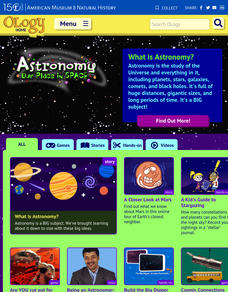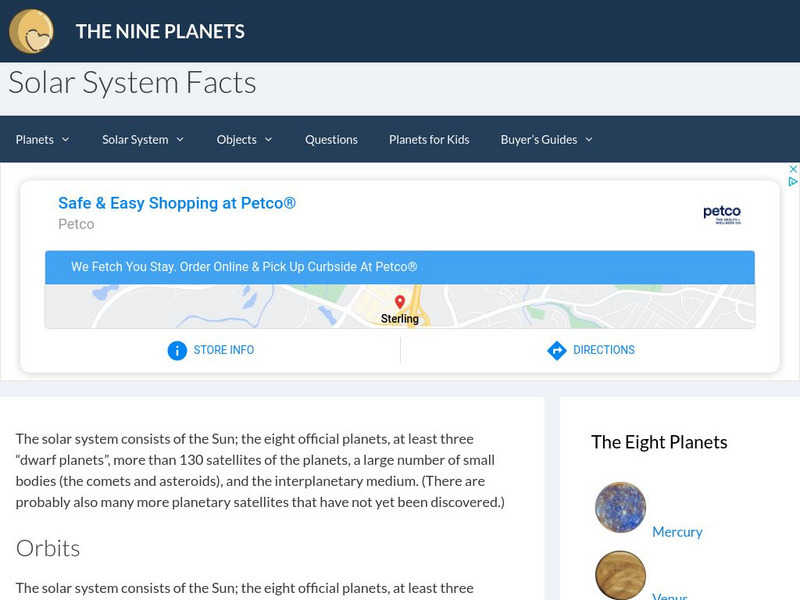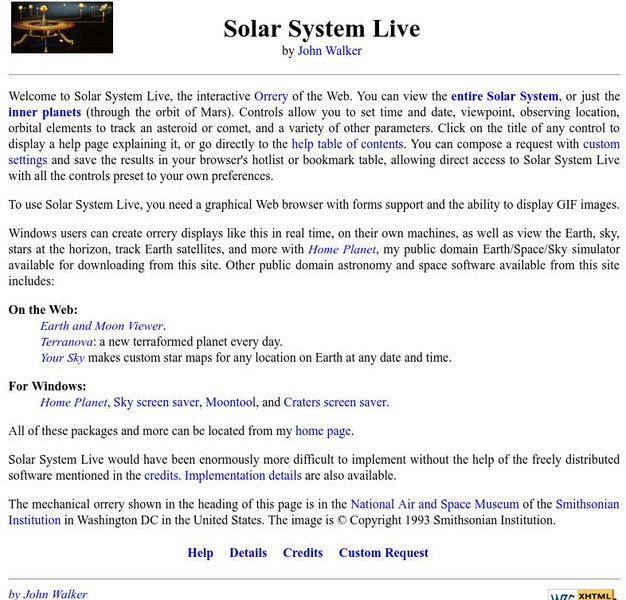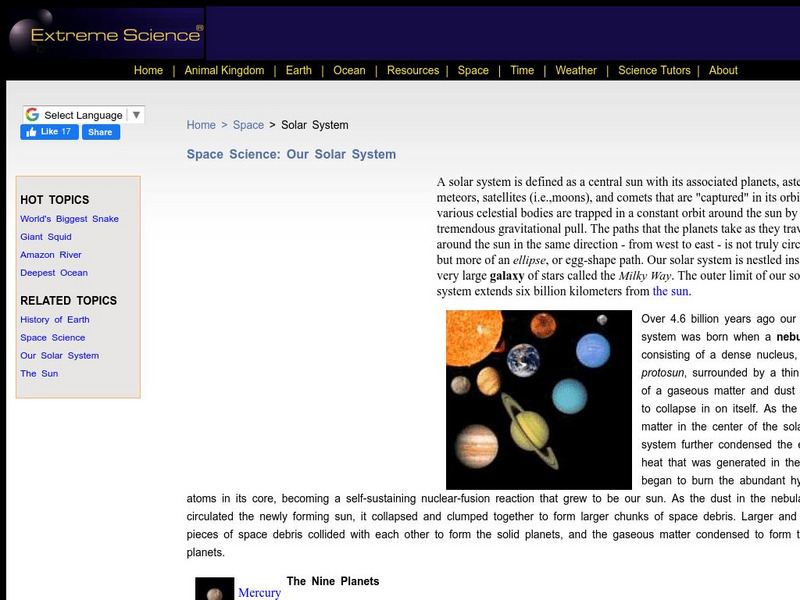American Museum of Natural History
Planetary Mysteries
Get to know our little part of the vast universe. Learners read about the common and not-so-common facts about each of the planets in the solar system. The interactive lesson includes a large amount of information as well as a quiz to...
American Museum of Natural History
Beyond Planet Earth
Scholars take a journey through space with 16 eye-catching images. Along the way, learners read captions starting with the moon, then move onto asteroids, Mars, and Jupiter.
American Museum of Natural History
Planetary Mysteries
A website all about planetary mysteries—it's a one-stop-shop for all things, stars, planets, and space travel. Scholars read an astronomy overview to discover the page's big ideas, then choose from the plethora of resources, including...
American Museum of Natural History
A Closer Look at Mars
A website looks at how we know so much about Mars—telescopes, robots, and spacecraft—and the search for martian life. Following the informational text are three questions that quiz pupils about possible life on Mars.
American Museum of Natural History
What is Astronomy?
Go study the universe. Pupils learn seven aspects about astronomy and astronomers. They begin to learn about constellations; distance and motion between objects; gravity; the electromagnetic spectrum; dark matter and energy; and teams of...
American Museum of Natural History
One-on-One With The Sun
Follow along as Stella Stardust interviews the sun. A fun and informative interview provides scholars with information about the sun.
NASA
Nasa: Solar System Exploration
This stunning site on the solar system gives a great overview of the planets and our sun. Learn about each object's size, vital statistics, and moons. Then go on for a more in depth look at these objects in the column on the left.
Enchanted Learning
Enchanted Learning: The Planets
This survey of the planets includes all the basics, size, mass, atmosphere, length of day, and the like. It features interactive activities and learning exercises and compares all of the planets in colorful tables.
Space Telescope Science Institute
Hubble Site: Solar System Images
A listing of clickable images of objects in the Solar System from the Hubble telescope that includes the following: Venus, Mars, Jupiter, Jupiter's satellites, Saturn, Saturn's rings and satellites, Uranus, Uranus' rings and satellites,...
Nine Planets
The Nine Planets: An Overview of the Solar System
A detailed overview of the history, mythology, and current scientific knowledge of each of the planets and moons in the solar system.
National Earth Science Teachers Association
Windows to the Universe: Our Solar System
Our solar system is filled with a wide assortment of celestial bodies - the Sun itself, our eight planets, dwarf planets, and asteroids - and on Earth, life itself! The inner solar system is occasionally visited by comets that loop in...
California Institute of Technology
Spitzer Science Center: Historias Desde Espacio: Premiacion a Las Planetas
All the planets are competing to see who is the best planet in the Solar System. Read the story in Spanish to learn the results of the pageant. Excellent source of information presented in a fun manner.
NASA
Nasa: Sci Jinks: How's the Weather on Other Planets?
Compare weather here on Earth to other planets and moons in our solar system. You will find many similarities and differences.
Fourmilab Switzerland
John Walker: Solar System Live
This planetarium program allows you to create an accurate model of the solar system with icons or pictures of each planet. You can specify a date in the past or the future, change the viewpoint to any latitude/longitude, and even view in...
Enchanted Learning
Enchanted Learning: Zoom Astronomy: All About Space
A fantastic collection of information about the solar system. Includes information on all of the planets, the moon, the sun, asteroids, comets, meteoroids, and stars. Also find puzzles, a dictionary, quizzes, classroom activities, and...
NASA
Nasa Star Child: Planet Hop
Figure out your age and your weight on all the planets in the solar system using the formulas given here. Then type them into the correct place, and let the computer check to see if you are correct.
Extreme Science
Extreme Science: Space Science: Our Solar System
Read about our solar system and its formation over 4.6 billion years ago. Find out about the planets, asteroids, meteors, satellites, and comets. More in-depth planet background can be accessed through links.
American Geosciences Institute
American Geosciences Institute: Astronomy
Eight hands-on lessons module in which students explore the characteristics of planet Earth, its moons, the sun, the solar system, planets, and the difference between science fact and science fiction.
NASA
Nasa Star Child: Jupiter the Largest Planet
Here at this site from NASA you can learn about the planet Jupiter! Read, or listen to, what makes Jupiter so special in our solar system.
NASA
Nasa: Cassini: Mission to Saturn
NASA site details what sets Saturn apart from the other planets in our solar system and why the Cassini spacecraft mission is important.
Natural History Museum
Natural History Museum: Our Place in the Universe
Part of a larger online exhibit on the moon and space, this site deals with one's place in the universe. The topics covered include the sun and solar system, the galaxy, and the universe.
Exploratorium
Exploratorium: A Guide to Astronomy Resources
A portal to resources on the sun, the Earth's neighboring planets, and the weather in space. Find out why Saturn is the "jewel of the Solar System" and explore what happens when Venus and Mercury make their rare transits across the sun.
Other
Canal Kids: Ciencias (Science for Portuguese Speakers)
Colorful, engagingly written information about astronomy and biology for Portuguese-speaking English language learners. Both subjects are broken down into a broad array of related subtopics. The biology section is particularly helpful...
NASA
Goddard Education: Eclipse 99
Information is provided about the eclipse of 1999; in addition, facts about elcipses throughout history are also included.




















